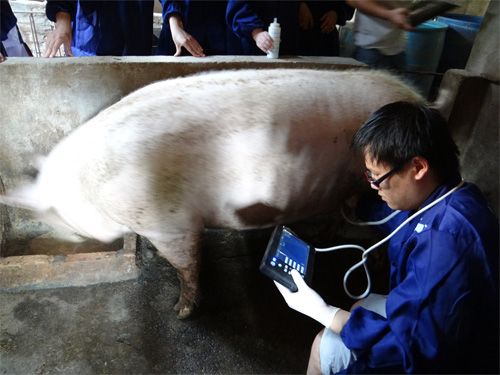Limiting feeding during the estrus period of young sows may reduce early embryo survival rates by affecting the quality of oocytes. Feeding young sows with 2.8 times the maintenance requirement before mating has a higher embryo survival rate than feeding sows with 2.1 times the maintenance requirement. This result can also be clearly observed through BCF imported pigs and B-ultrasound. Moreover, the collected blastocysts have significant metabolic and secretion abilities during in vitro culture, and the differences within the same litter are relatively small, which will result in small differences in litter birth weight and vitality. During the late luteal phase (8-16 days in the cycle) and the early luteal phase (1.7 days in the cycle), the embryo survival rates were 68.3% and 83.6%, respectively. This indicates that the metabolic response triggered by feeding restriction during the critical stage of follicle growth during estrus may affect oocyte maturation and subsequent embryo survival. The mechanism behind the above results is still uncertain, and it may be due to the influence of nutrition on follicular development. When nutrient deficiency occurs, the follicular development of sows is observed to be smaller on B-ultrasound in BCF imported pigs. This affects the quality and developmental ability of oocytes. Improving nutritional levels may enhance the quality of oocytes, thereby increasing the survival rate of early embryos; Some people also believe that the quality of oocytes may be closely related to the survival rate of early pregnancy embryos. Part of embryo loss is caused by immature oocytes undergoing meiosis, or by eggs that cannot develop or co develop with the uterine environment at a normal rate due to genetics.

For lactating sows with their first pregnancy, those who satisfy their appetite during the 4-week lactation period have larger follicles and higher embryo survival rates compared to those who only satisfy half of their appetite. Additionally, sows with high appetite have more oocytes developing into the cell stage. This result can be clearly observed through B-ultrasound observation of fetal viability using BCF imported pigs. The insulin and IGF system present in follicular fluid may affect oocyte development, and further research is needed on the types and characteristics of follicular secretions. Therefore, nutrition can affect the maturation and quality of oocytes, which is also extremely important for the survival of embryos and the growth of fetuses.
tags: B-ultrasound in pigspigs and B-ultrasoundultrasoundB-ultrasound


